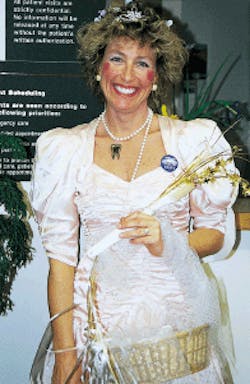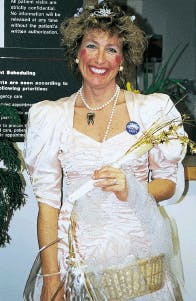Rocky Mountain Highs
Two hygienists. One dream.
From a simple conversation, Debby Spence`s SmileMasters has evolved into a dream job and a gigantic benefit for the employees and families of a Colorado company.
Cathy Hester Seckman, RDH
When Debby Spence goes to work in the morning, unlocks the door, hits the lights, flips the compressor switch, and turns on the computer, she does it with a possessive air that few hygienists can muster. Spence is the owner and sole proprietor of SmileMasters, a dental hygiene clinic on the grounds of StorageTek, a global information-storage provider headquartered in Louisville, Colo.
Most hygienists can only dream about self-employment, but it`s been a reality for Spence for more than three years. She has 2,100 patients who are workers at the StorageTek campus, their spouses, and children. She employs an assistant and shares a receptionist with other health-care professionals in the company`s Wellness Center.
"It`s a dream job," Spence said. "I love being the only dental professional here. I just adore it. There are some risks involved, but having to support a family, it has literally been a dream come true for me. Financially, it`s been incredibly good. I tripled my salary the day I went into business for myself, but I work very, very hard."
One of the reasons Spence loves self-employment, with its increased income and flexibility, is because she is a single mother of four. Elizabeth, 23, lives in Costa Rica, where she teaches English literature and music. Marissa, 21, is a junior at the University of Colorado with a triple major in math, international business, and Spanish for the professional. Stephanie, 18, graduated from high school earlier this year and attends firefighter academy and EMT school. Geoffrey, 15, is a high school freshman busy with football and track. Because of her business success, Spence has been able to take her three oldest children on a tour of Europe as a high school graduation gift.
Spence, originally from Springfield, Mass., is a 1974 summa cum laude graduate of the University of Vermont, where she earned an associate degree in dental hygiene. She also is a licensed emergency medical technician.
"I had two patients pass out in the chair. The first time it happened, I was paler than he was," Spence said. "I took a class in emergency medicine for the dental office, because I really wanted to be prepared. The experience was awesome, so I decided to go to EMT school. I worked for a fire department for a while as a volunteer paramedic, and I loved it, but when I started my business, it just got too intense."
Spence didn`t start out in her profession to be self-employed. She was a typical hygienist working for a typical dentist in Louisville. One day, a patient who worked for StorageTek invited her to represent the dental field at a company health fair.
"I went and we started talking," Spence said. "I asked if the company had ever thought of offering dental hygiene services on-site. He said it was a great idea, but the only way he`d do it was if I was the hygienist. I went back and talked to the doctor about it, and we thought, `Why not?` The doctor provided the equipment. StorageTek gave us 200 square feet at the Wellness Center, with water lines, suction, and utilities. We shared a receptionist with the physician, physician`s assistant, nurse, optometrist, and physical therapist already there. I started working there two half-days a week as the doctor`s employee."
Spence began with no patients, but the news spread quickly. "It was basically word-of-mouth. At lunch time, I`d go to the cafeteria and try to find someone I knew or just sit at a big table. I`d go up to people and say, `Hello. Have some floss. Did you know that I`m the new hygienist here? Here`s my card.` "
In eight years, Spence built the practice to 500 patients. She needed to spend more and more time at StorageTek, and the dentist wasn`t entirely comfortable with having her at his main office less and less. Because his own practice was growing, it was becoming increasingly difficult for him to manage a satellite office. Spence decided it was time to go out on her own.
"I put in a bid for the contract myself," Spence said. "When I told the doctor, he was incredibly gracious and wonderful. He had tears in his eyes when he said, `You deserve it. You`ve been fabulous. I`ll miss you.` I bought his equipment from him, put out a brochure, and started marketing aggressively. At that time, I probably was working four days per week."
The rest, as they say, is history. Today, Spence has 2,100 patients and works about 50 hours a week. SmileMasters averages 55 new patients a month. She still shares a receptionist, but employs her own assistant.
"I also have a financial planner, an accountant, and a bookkeeper," she explained. "As an independent hygienist, my practice income is exceptional and I can afford to hire them. I also have a contract with the dentist to read my X-rays."
Imagine that — Spence contracts with a dentist to read her X-rays. It`s a thought that can bring a smile to the face of any hygienist, but it`s also frustrating because Spence is perfectly capable of reading her own X-rays. After all, she passed the board exam.
"But what Colorado dental practice law says is that I can take X-rays if a dentist reads them," she said. "I send the doctor my X-rays with notes like, `Check distal margin on #31.` He sends back a written report, then I call or e-mail the patient. I use double-packet film, so one copy goes to the patient or his or her dentist, and one copy stays with me."
Another frustrating part of her practice is tiptoeing around the legalities of talking to patients about their oral health.
"I`m not legally allowed to diagnose, but I am legally allowed to say I`m observing something unusual. I recently saw a patient with a huge Class V buccal on #31 that was very sticky. I had the patient take a mirror and showed it to him, and he felt the stick. I said, `That`s a concern to me. As you know, everyone sees things differently and has a different approach to what they want to restore or what they feel needs restoring. When you saw your dentist two or three months ago, it may not have seemed that much of a need. However, it certainly seems that way to me now and, if you`d like to get it checked again, I`d certainly recommend it.`
"I don`t specifically say, `You have a cavity,` but I can say, `You have an area of concern.` I`ll typically make a note on one of my business cards and have the patient take that to his or her dentist. I go ahead and tell patients that I`m not legally allowed to diagnose, but that I`ve looked at teeth for 26 years and know a lot about them. Any thinking person can understand that his or her tooth needs attention."
Maintaining good relations with area dentists is a skill nurtured by Spence. "We try to be politically correct and we try not to ruffle any feathers. Because I send patients to so many different dentists, I`ve become an incredibly good diagnostician. Maybe the best part of my practice is that I feel my patients can believe what I tell them needs to be done. They know I am an unbiased source of opinion. They know I can`t do the work and I don`t have a vested interest in where or by whom they have their restorative dentistry done, so they trust me. That`s the most rewarding part of my job. I`m honest with patients, but I really try to recommend optimal dentistry."
For a typical appointment, Spence`s assistant, Lisa, sets up the room, seats the patient, and assists with charting. Afterward, Spence strips the room and runs the ultrasonic and autoclave, while Lisa wipes down and sets up for the next patient. Lisa`s other duties include running X-rays to and from the dentist`s office and making and confirming appointments. She keeps in touch with patients by e-mail, sending out reminders, birthday congratulations, and reports on X-rays.
The practice is 85 percent adults. Each patient gets a 45-minute appointment. Because none of that time is used by a dentist for an exam, Spence actually spends more time with the patient than the average hygienist. New patients and perio patients are given an hour, and children get 30 minutes for cleaning and fluoride treatment.
"I don`t do sealants," Spence noted, "because it`s such a gray area in the dental practice act. It is legal, but we could get caught on a technicality, so I don`t even go near it."
Open appointments are few and far between at SmileMasters. "I have a very long short-call list, and Lisa is on it immediately if someone breaks an appointment. My patients are mostly right on campus and can walk over in two minutes."
Spence, like other hygienists, is a meticulous and careful worker. She has the added bonus of having complete authority in her environment.
"It feels great to have responsibility for my equipment and to be in control of it," she explained. "I actually sharpen my instruments at each use and sharpen my explorers regularly. I also pay for everything, but it`s a small price to pay for the ease of working with top-notch equipment. I don`t think I could be nearly as productive if I were battling with broken stuff."
Continuing education is not required in Colorado, but Spence attends classes frequently to keep in touch with other dental professionals. "After working for dentists for 23 years, I don`t feel isolated now, but I take care to interface a lot at classes. I feel continuing education is important for me, but it`s not mandatory. It`s amazing to me that there is no requirement in Colorado, because we`re so progressive in other areas."
Spence also does motivational speaking, and offers consulting services to other hygienists who would like to start their own businesses. She feels marketing is one area of expertise that has helped her practice grow quickly. Anyone interested in more information is welcome to contact her at [email protected] or at [email protected].
Cathy Hester Seckman, RDH, is a frequent contributor to RDH. She is based in Calcutta, Ohio.
Debby Spence as the Tooth Fairy

